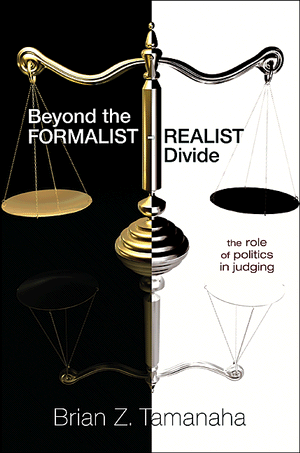Legal Formalism and Legal Realism: What is the Issue?, a review of
Brian Tamanaha,
BEYOND THE FORMALIST-REALIST DIVIDE, has just been posted by
Brian Leiter, University of Chicago Law School. It is forthcoming in
Legal Theory (2010). Here's the abstract:

This is a review essay discussing Brian Tamanaha's book BEYOND THE FORMALIST-REALIST DIVIDE (Princeton University Press, 2010).
Regarding Tamanaha's historical thesis that "formalism" was not widely accepted in the 19th-century and that realist themes long predate the American Legal Realists (hereafter "Realists") of the 1920s, I argue that (1) Tamanaha adduces enough evidence to state at least a *prima facie* case against any historian who wants to claim that in the 19th-century jurists and scholars generally believed that common-law judges did not make law in new circumstances ("Natural Law Formalism") and that judging was simply a mechanical exercise in deductive reasoning ("Vulgar Formalism"), although we still need to know how representative Tamanaha's evidence is; (2) whether 19th-century jurists and scholars held or rejected more sophisticated (and philosophically interesting) forms of formalism is not addressed at all by Tamanaha's evidence; (3) Tamanaha does not make even a *prima facie* case that the distinctive theses of the Realists had widespread traction in the 19th-century, partly because he emphasizes themes that were not, in fact, distinctive of Realism (e.g., the political influences on judicial decision), and partly because, when considering distinctive Realist themes, he adduces inapposite evidence or misrepresents the sources he quotes.
Regarding Tamanaha's jurisprudential thesis that we can now move beyond the formalist-realist divide, I argue that (1) what Tamanaha calls "balanced realism" is a somewhat less precise version of the account of Realism developed by Schauer and myself going back some twenty years; (2) Tamanaha is mistaken in arguing that everyone is now a "balanced realist" largely on the basis of remarks by post-Realist judges (some of whom, like Harry Edwards, recognize that it remains controversial) and without according adequate attention to countervailing evidence, such as the Vulgar Formalism characteristic of public political debate about adjudication in the U.S.; theoretical accounts of adjudication like Ronald Dworkin's, which try to vindicate Natural Law Formalism without any hint of Vulgar Formalism; and the self-understanding of other common-law legal cultures, like England's, which embody formalistic elements; and (3) Tamanaha's attempt to show that "formalism" is "empty" actually demonstrates its substantive meaning for many contemporary theorists as a normative theory or ideal for adjudication, rule-application and/or legal reasoning. "Formalism" and "realism," once precisely characterized, remain useful jurisprudential categories, whatever the historical verdict on whether 19th-century jurists held Vulgar or Natural Law versions of formalism.
LHB readers will remember the on-line discussion of Tamanaha's work with
Lewis Grossman here,
here and
here.
